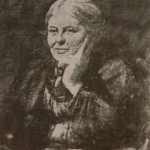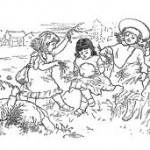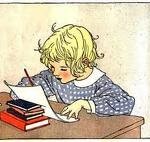Foundational Principles: Education is an Atmosphere, a Discipline, and a Life

Charlotte Mason is famous for her motto: Education is an atmosphere, a discipline, and a life. With these three “instruments” a child can receive a real education, which is an education that not only stretches her mind but also nurtures her heart. She grows up in a home where she is cherished and inspired (atmosphere), where she is strengthened in virtue(discipline), and where she is surrounded with noble books and ideas (life).
The Atmosphere of Environment: By “atmosphere” Mason meant the spiritual, intellectual, and physical environment in which the child lived and learned.
A child can learn best in an atmosphere in which she knows she is valued and cherished. Mason objected to empty moralism and cruel motivators like fear. Instead we should ensure our children grow up in an environment where:
- they are surrounded with the best of ideas and culture,
- they have plenty of free time for play, and space to make lots of noise,
- they are respected for who they are rather than for who they might become,
- they are given work appropriate for their developmental level, and
- they are surrounded with beauty and laughter.
Homeschoolers appreciate Mason’s confidence in the family as a locus of true education. Indeed, Mason saw the natural environment of the family as superior to any superficial or contrived educational environment. Family life will expose children to many different people and experiences.
The child living with her siblings and parents lives through  illnesses and revivals, comes to know her garden and its inhabitants, and overhears dinner conversations between children and adults alike. This child observes the comings and goings of friends and extended family, and witnesses the celebration of birth and the mourning of death.
illnesses and revivals, comes to know her garden and its inhabitants, and overhears dinner conversations between children and adults alike. This child observes the comings and goings of friends and extended family, and witnesses the celebration of birth and the mourning of death.
Mason believed that this natural and dynamic exposure was critical to becoming truly educated.
The Discipline of Habit: In order for children to thrive in relationships with others, they must form the right habits. It is our responsibility to foster good habits in our children from birth. Mason rejected child training based on fear or force. Our goal is to educate the conscience of the child so she becomes self-disciplined. She does the right thing simply because it is right and not because she is fearful of punishment or wants a star on a chart.
 The Life Found in Worthy Ideas: Mason believed that ideas were spiritual in origin, and that the best ideas could be found in “living books” and in great art and music. These worthy ideas feed a child’s mind just as good food nourishes her body. Mason objected to educational “twaddle” – dumbed down books that lack inspiration or imagination. She also believed children should have access to outdoors every day and should be given the chance to appreciate the natural world.
The Life Found in Worthy Ideas: Mason believed that ideas were spiritual in origin, and that the best ideas could be found in “living books” and in great art and music. These worthy ideas feed a child’s mind just as good food nourishes her body. Mason objected to educational “twaddle” – dumbed down books that lack inspiration or imagination. She also believed children should have access to outdoors every day and should be given the chance to appreciate the natural world.
Against this backdrop – education is an atmosphere, a discipline, and a life – her methods are applied in the various subject areas. In my next post, I’ll cover some of the more distinctive features of her applied method.